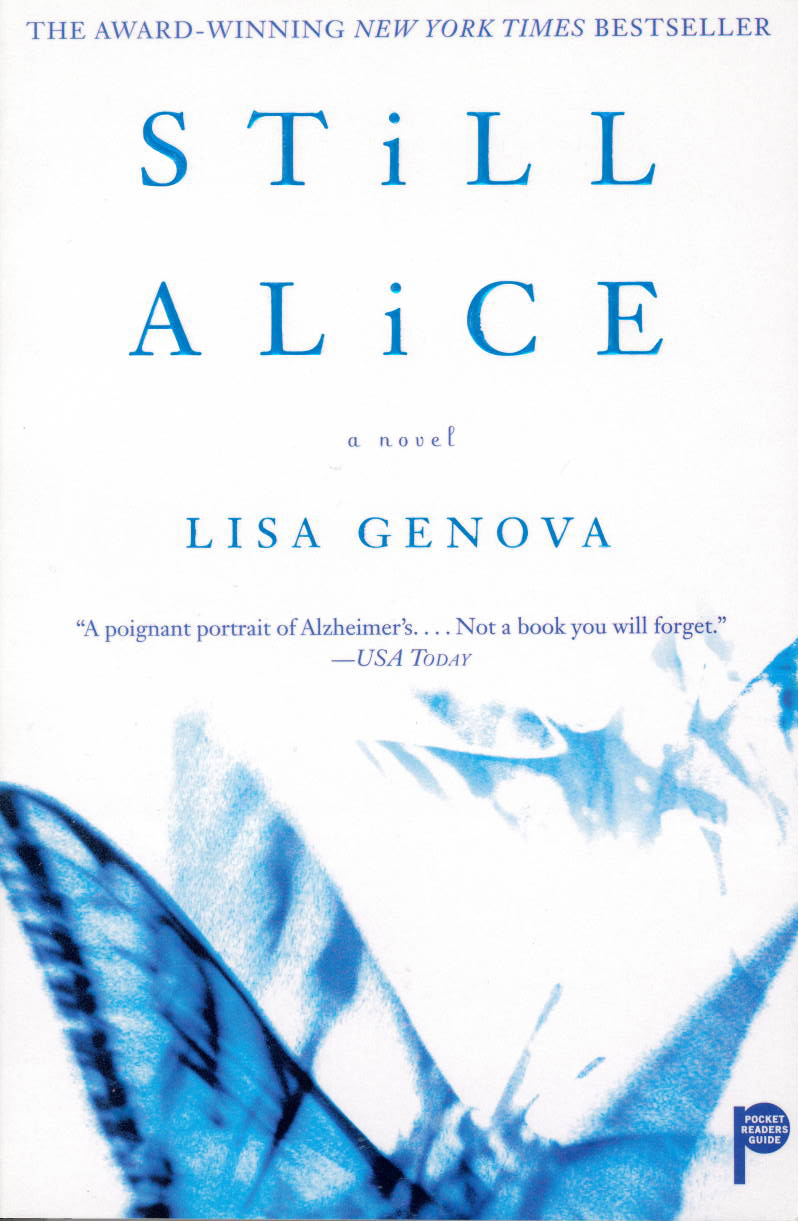Still Alice by Lisa Genova
 I’m not quite sure how this 2009 debut novel actually ended up on my iPod (surely I ordered it at some point) and why I decided to click on it when I did. How ironic that missing memory quickly became a point of concern when I realized what the story would be about … readers who appreciated that other Alice novel, Alice LaPlante’s spectacular Turn of Mind should absolutely, totally, utterly, immediately read this one.
I’m not quite sure how this 2009 debut novel actually ended up on my iPod (surely I ordered it at some point) and why I decided to click on it when I did. How ironic that missing memory quickly became a point of concern when I realized what the story would be about … readers who appreciated that other Alice novel, Alice LaPlante’s spectacular Turn of Mind should absolutely, totally, utterly, immediately read this one.
Alice Howland’s husband can’t find his glasses. Again. “How could he, someone so smart, a scientist, not see what was right in front of him.” How many times have I had that exact same thought?
But through the rest of that first chapter, Alice is the one who can’t remember where her BlackBerry charger is hiding, can’t conjure up the word lexicon in the middle of a familiar lecture she’s giving, tells her daughter the wrong arrival time of her flight, and most disturbing of all, suddenly doesn’t know where she is while she’s out for a run on the same streets she’s called home for 25 years.
Alice is a renowned cognitive psychology Harvard professor who specializes in linguistics. She’s married to a brilliant scientist and fellow Harvard prof who just might someday soon find the cure for cancer. They have three grown children together, the older two highly accomplished, the youngest still searching and taking her own path. In October 2003, Alice celebrates her 50th birthday. The following January, she’s diagnosed with early-onset Alzheimer’s disease.
Even as her protagonist is a brilliant, still-young woman with an incurable disease whose life spirals out of control, Lisa Genova – herself a Harvard-trained neuroscientist – never, ever devolves into hand-wringing, maudlin pity. As Alice forgets more and more of her inspiringly accomplished life, Genova begins to replace her erudite vocabulary with ‘something,’ and ‘thingy,’ all the while continuing Alice’s story with compassionate insight – through all the loss, she remains still Alice. Her illness brings moments of surprising grace: understanding (if not forgiveness) of her difficult father’s final years, new friendships with others living with her same disease, and a renewed, evolving relationship with her youngest daughter.
In the final speech Alice ever gives before an audience, she sends out a much-needed request and heartfelt reminder to every one of us: “‘I encourage you to empower us, not limit us. If someone has a spinal cord injury, if someone has lost a limb or has a functional disability from a stroke, families and professionals work hard to rehabilitate that person, to find ways to cope and manage despite these losses. Work with us. Help us develop tools to function around our losses in memory, language, and cognition. Encourage involvement in support groups. We can help each other, both people with dementia and their caregivers, navigate through this Dr. Seuss land of neither here nor there.
“‘My yesterdays are disappearing, and my tomorrow are uncertain, so what do I live for? I live for each day. I live in the moment. Some tomorrow soon, I’ll forget that I stood before you and gave this speech. But just because I’ll forget it some tomorrow doesn’t mean that I didn’t live every second of it today. I will forget today, but that doesn’t mean that today didn’t matter.'”
One last word of warning: If you don’t want to make a total spectacle of yourself, don’t read or stick in your ears in public [Genova herself crisply narrates the audible version of this deservedly award-winning bestseller]. That said, while you’re making a blubbering puddle of yourself, someone just might ask you why … which will give you the opportunity to share the book, and the love. In the end, you’ll see … it’s all about the love.
Readers: Adult
Published: 2009
Sorry, the comment form is closed at this time.

Discussion